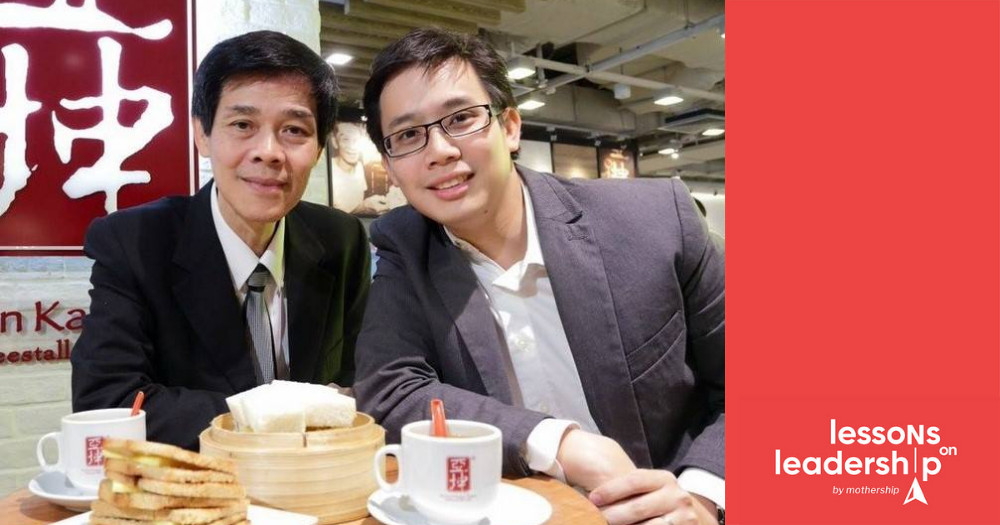COMMENTARY: "I think it is good to have a plan because, of course, you cannot go through life without one. However, if you hold your plans too tightly, then you may not actually enjoy the process."
Jesher Loi is the grandson of Loi Ah Koon, the founder of heritage brand Ya Kun International. He began his time at the family company as his father's personal assistant. Fast forward 11 years, the 36-year-old serves as the director of branding and market development.
Loi's path, however, was not always clear to him. As a young university student, he felt conflicted between his passion for music and his aptitude in the sciences, as well as his inclination toward business.
Lessons on Leadership is a Mothership series hoping to inspire the next generation of Singaporeans through the stories of Singapore’s many successful business leaders and entrepreneurs.
Loi shares his personal journey to balance his family's business with his love for conducting, as well as the lessons he hopes to impart to his current music students.
By Jesher Loi, as told to Jane Zhang
Business only began growing in early 2000s
The family business was a process that grew over many years. It was only in 2001 that the business really kicked off.
Before that, for decades there was only one shop. Even when my grandfather began to gradually retire in the 1990s, there was no talk of succession, no ambition to expand.
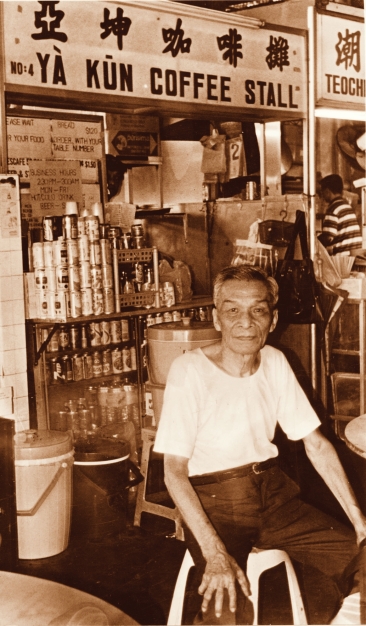 Jesher's grandfather, Loi Ah Koon, founded Ya Kun as one coffee stall. Image courtesy of Ya Kun.
Jesher's grandfather, Loi Ah Koon, founded Ya Kun as one coffee stall. Image courtesy of Ya Kun.
On the weekends, my dad would go down to the shop to help out. He had a nine-to-five job in a completely different field, but on Saturdays he would travel to the shop and spend the mornings just toasting bread. That was where his heart was — you could see that was where he was excited to be.
Even then, however, he and my mum did not expect that they would carry on the family business, and they never imagined that it would grow so large.
It wasn't until 1999 or even 2000 that my parents realised that it would very likely be up to them and my dad's brother to carry on the business. Together as a team, they began to professionalise the business, and the shop did very well, with increasingly long lines.
People began to say things like, "Hey, why don't you just go somewhere else? I mean, if you have two, it's going to be double the sales; and you'll lessen the pressure on one outlet, right?"
So that is when they decided to expand.
While my parents were busy building Ya Kun, I was busy studying
In 2001, none of this was on my radar, to be honest, since I was only in Secondary 4. At that point, I was still studying and enjoying my CCAs, preparing to go to Junior College.
At that point in the early 2000s, the government was really pushing students to join NUS Life Science. While I was at National Junior College, there was a lot of encouragement for us to apply for that major.
I always had an interest, though, in biology, in some form or another. I was so serious that I actually went for a medical internship halfway through JC, and followed doctors for two weeks.
To be fair, I didn't pay attention to what my parents really did. I mean, I knew that they were expanding the business, but at that age things like accounting, HR, and finance held little importance to me.
What I do remember was how energised they were and how excited they were at home. They started to win awards. There was a lot of euphoria over entrepreneurship because back then it was a groundbreaking concept.
At that time, there were no mentors or fireside chats. There was no one to counsel them on what to do. If they needed assistance over the matter of accounting, they talked to someone from church. If they needed legal advice, they spoke to someone at church.
As trailblazers, they did everything themselves.
Although there was the rare occasion when the business overlapped with my schoolwork — once we participated in a fundraising drive with a booth at NJC's fun fair — for the most part I was still just a student.
My main focus was my studies, not the future. After all, at 16 or 17 years of age, kids aren't necessarily thinking long-term about their careers. For me, I knew what I was good at and what I enjoyed studying. Based on just those two reasons, I chose biology as my emphasis.
Over the years, I've come to the realisation that basing a big decision purely upon those guidelines is, in and of itself, a flaw. In fact, I think that is a mindset that young people need to work on, and we need to help them learn how to make such decisions with a more well-rounded process.
However, back then, that was how I decided what to major in, and I followed that path all the way until army.
And my time in army changed everything.
Making the decision to take a gap year
While I was in army, I had plenty of time to think. I was struck how we were all going along exactly the same path: serve, ORD, enter university. Even though I had already secured my place in NUS Life Science, I realised I wanted take a break after army and experience one year of something different before resuming my studies.
I decided to take a gap year.
Now the question became, what should I do during my gap year? Despite my focus on the sciences in school, I had always been involved in music, both in secondary school and in JC. In fact, I had been the vice-chair, the president of my CCA, as well as concert master. I was even conducting the youth choir at my church.
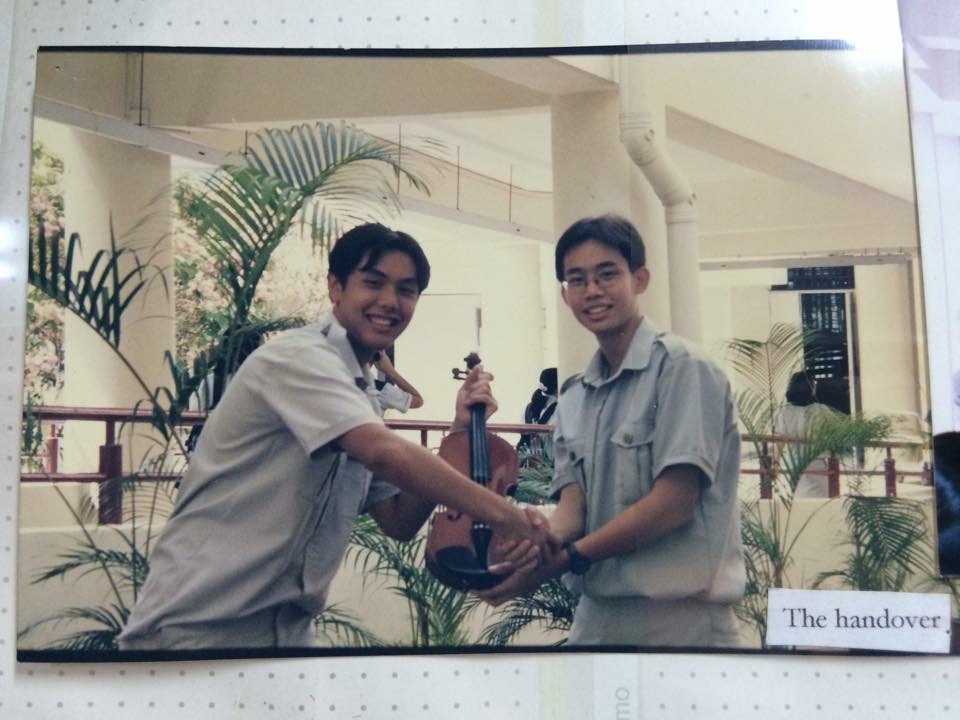 The symbolic handing over of the Concertmaster role at NJC to Loi (right) by his senior. Photo courtesy of Jesher Loi.
The symbolic handing over of the Concertmaster role at NJC to Loi (right) by his senior. Photo courtesy of Jesher Loi.
I thought to myself, why don't I go study music? The choice seemed simple, especially since it was only going to be one year.
It so happened that my family had some good friends in the U.S. One of them actually worked at a university there, and so through her and her contacts, I explored the opportunity of studying overseas.
I actually sent most of my applications and recordings while still in army. I was accepted, and thankfully, I even received a music scholarship.
Meanwhile, the business already had more than 20 outlets. It was getting busier by the day and gaining significant momentum. The success of the business was what enabled me to study overseas, and I'm very, very grateful for that. I do not take that for granted.
How the gap year turned into four years
The challenge I faced was that the school in the U.S. did not acknowledge gap years. Instead the admissions office suggested that I simply enrol as a regular student, take all the classes I was interested in, and then "drop out" of school once I was finished.
Meanwhile, I spoke with NUS about my predicament, and they very kindly said that they approved of this enterprising spirit and so they would be willing to keep my spot for another year. They were very open-minded about it.
However, I knew that if I did not want that spot, then it was only fair to let NUS know so someone else could take my place. I was torn because if I truly gave up my place at NUS, then that was it; I would no longer be coming back to Singapore to study.
So I packed up and went.
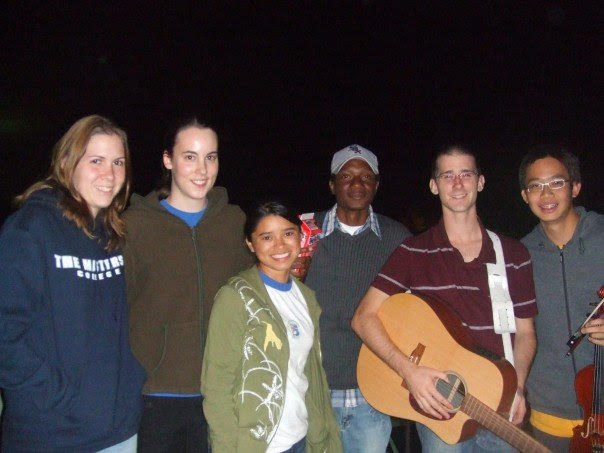 Loi with friends from university, standing out in the cold and singing happy birthday to a friend. (Photo courtesy of Jesher Loi)
Loi with friends from university, standing out in the cold and singing happy birthday to a friend. (Photo courtesy of Jesher Loi)
Leaving was tough — that was my first time leaving home, and I was an only child. When I arrived on campus, I was lost and clueless, but I quickly settled in and started my music studies.
When I was planning out my courses for the year, I did not sign up for any gen ed classes (the 101 courses). Instead, I ploughed straight into all the music courses. Everyone else thought I was crazy, but I knew I had to be focused. I was there for only one year, and then I was going home.
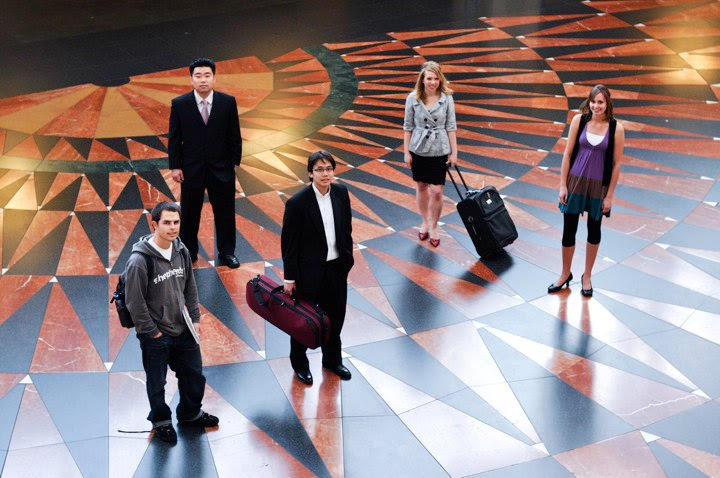 Loi with some of his U.S. school orchestra friends. (Photo courtesy of Jesher Loi)
Loi with some of his U.S. school orchestra friends. (Photo courtesy of Jesher Loi)
Over the months, however, my perspective radically changed. The environment there — the constant practising, the concert attendance, the feeling of waiting backstage to perform — it was phenomenal.
I loved it so much that halfway through, I told my parents that I wanted to do my undergraduate studies there. I explained that I already had one foot in the door and that the atmosphere was very congenial. It was a really nice, safe campus. I was enjoying myself.
I told them I wanted to continue.
We needed to have a serious conversation over whether I should give up my slot at NUS. As we talked through the options, one suggestion we thought about was to give up my spot and apply again later. I was concerned, though, because there was, of course, no guarantee that I would be able to secure a spot a second time.
I decided to continue my education in the U.S.
From science to business to music
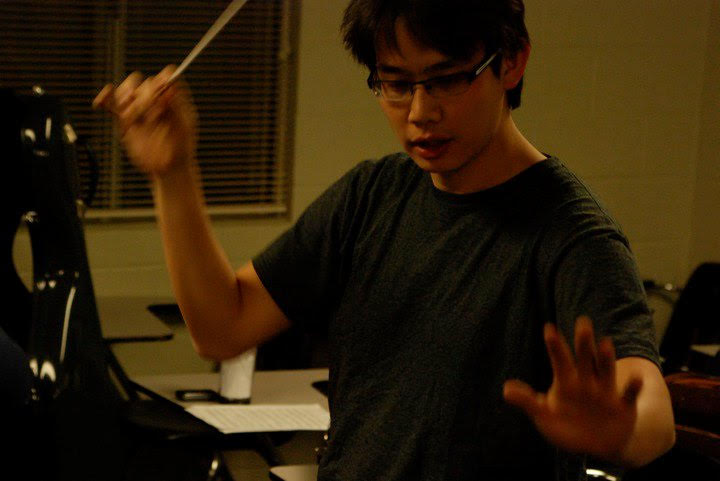 Loi rehearsing for his final year recital. (Photo courtesy of Jesher Loi)
Loi rehearsing for his final year recital. (Photo courtesy of Jesher Loi)
I wanted to do music. I loved it, and I enjoyed it.
My parents were very sensible and practical. So while they understood that I loved music and that it was my passion, they also wanted to make sure that I had thought through my decision. They were willing to allow me to continue my studies in the U.S., but they recommended that I considering changing my major.
So I became a science major. I had always had an affinity for both science and music so choosing science as my emphasis made a lot of sense. I actually did very well that semester thanks to my solid Singaporean education! I received As in all of my classes — in fact, that semester I achieved one of my best GPAs during my time as an undergrad.
However, I couldn't settle in. My science classes were on one side of the campus, and on the opposite end was the music department.
I found myself constantly looking over at the block of music buildings and thinking how I missed them, how I wanted to go back, how I missed performing.
After one or two semesters, I ended up having a hard talk with my parents. Again, they were very understanding. They said they understood if I didn't want to do science, but asked if I had considered business as a major instead.
After all, I was their only child, and I would some day have to manage the business in some capacity or another. They encouraged me to give business a try.
 A poster for Loi's final recital before he departed the U.S. for home. (Photo courtesy of Jesher Loi)
A poster for Loi's final recital before he departed the U.S. for home. (Photo courtesy of Jesher Loi)
For the next semester, after switching my major to business, I juggled both business and music courses. That way I could still graduate on time, regardless of which major I ended up choosing.
Ironically, I struggled in some of the business courses because of my close ties to the family business. For example, I was able to grasp concepts of business management my dad explained to me because I could see it being practised in the family business; but when various schools of thought were taught in class I had difficulty remembering them.
In a way, because I already had a real life case study in front of me, understanding the philosophies behind the various theories was a challenge.
I realised that, at the end of the day, I did not enjoy business as a major. In addition, I treasured my time in the U.S. — I knew it was a precious, limited opportunity. Even after exploring other majors, I still loved music and deeply desired to do something with it.
I was also very clear that I wanted to use my classical training to help change people. I did not want to come and fight for a place in Singapore's local music scene. Instead, I wanted to use performing as a way to impact lives and give people something to think about on their drive home.
With all of this in my mind, I chose to return to music, and I finished my last two years of university as a music major.
At the same time, I completed a few more business courses. If I had managed to cram just one more course in by the time I graduated, I would have also gotten a business minor.
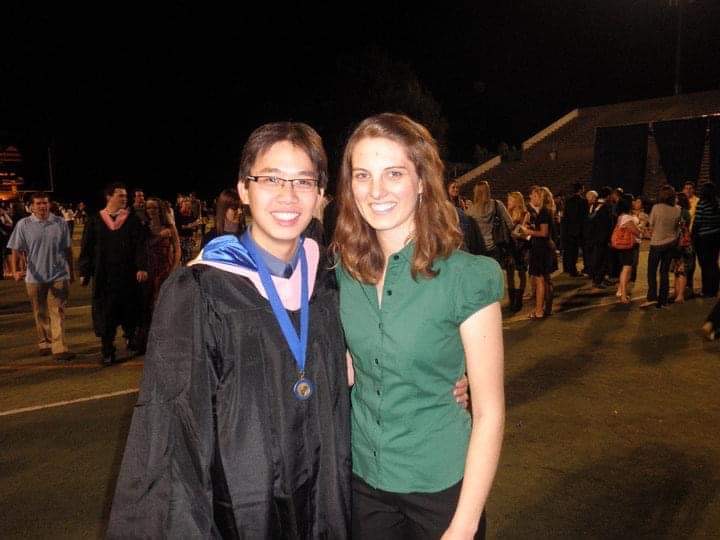 Loi at his university graduation in 2010 with his then-girlfriend, now-wife. Photo courtesy of Jesher Loi.
Loi at his university graduation in 2010 with his then-girlfriend, now-wife. Photo courtesy of Jesher Loi.
What working in my family's business is like
After graduation, I came back to Singapore — equally eager and clueless — and my dad offered me a position as his personal assistant. It was a flexible arrangement, one that not only allowed me to get my feet wet on the business side of things, but also to explore musical opportunities.
That first year was a year of adjustment for me. I was only 25 years old or so, I had just graduated and I was about to get married. In fact, the next few years was an entire period of transition for me, I think, as I settled into my roles.
It was probably strange for my colleagues, too, as they looked at me. They probably thought, "This guy is back. Is he going to have any bright ideas?"
I didn't have any bright ideas.
I am very grateful as I look back over the years since I graduated — the process took a long time. This year marks my 10th year working, and it was really only in the last four or five years that I really hit my stride.
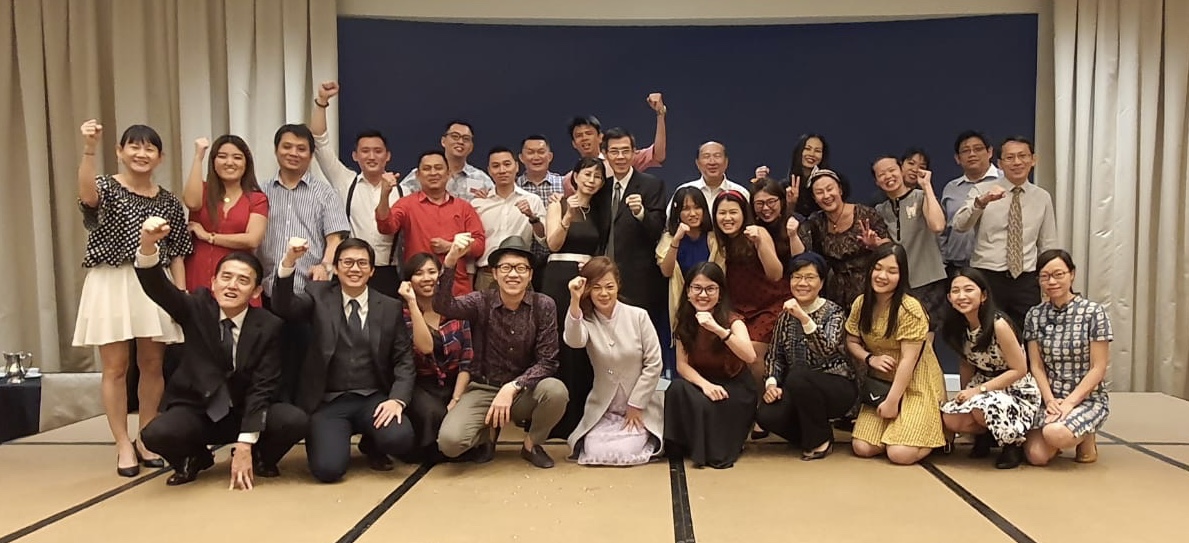 Loi and the Ya Kun office team celebrating Ya Kun's 75th Anniversary in 2019. Photo courtesy of Jesher Loi.
Loi and the Ya Kun office team celebrating Ya Kun's 75th Anniversary in 2019. Photo courtesy of Jesher Loi.
A lot of what I have gained is intangible. One example would be the ability and confidence to stand up to my parents on business matters when necessary.
Even reaching this point took time and experience. If I had done this when I was 28, I doubt they would have accepted it.
Actually, it can sometimes be very funny. We will have a heated debate in the conference room in front of other people, but then afterwards, we will turn to each other and ask, "Eh, what you want for lunch ah?"
We know that family is family, and work is work. And fair is fair.
I think that if I did not have the business, I would have pursued something totally different, something not in F&B. I may not have even worked in an SME. To be honest, perhaps I might have worked in government.
Even as I think about the what-ifs, I remain very, very grateful for what I have.
The business has opened a lot of doors. It has allowed me to maintain a day job while still pursuing other things, such as networking at the business federation, being a member of various boards, and meeting people.
Having a plan is good, but hold it loosely
Along the way, I obviously picked up a lot of other interests. The business has spawned passions and interests I never knew existed, such as mentorships or using HR as a tool to better people's lives.
In addition, I am able to run music CCAs part-time in JCs and secondary schools and use that as an avenue to help guide young people.
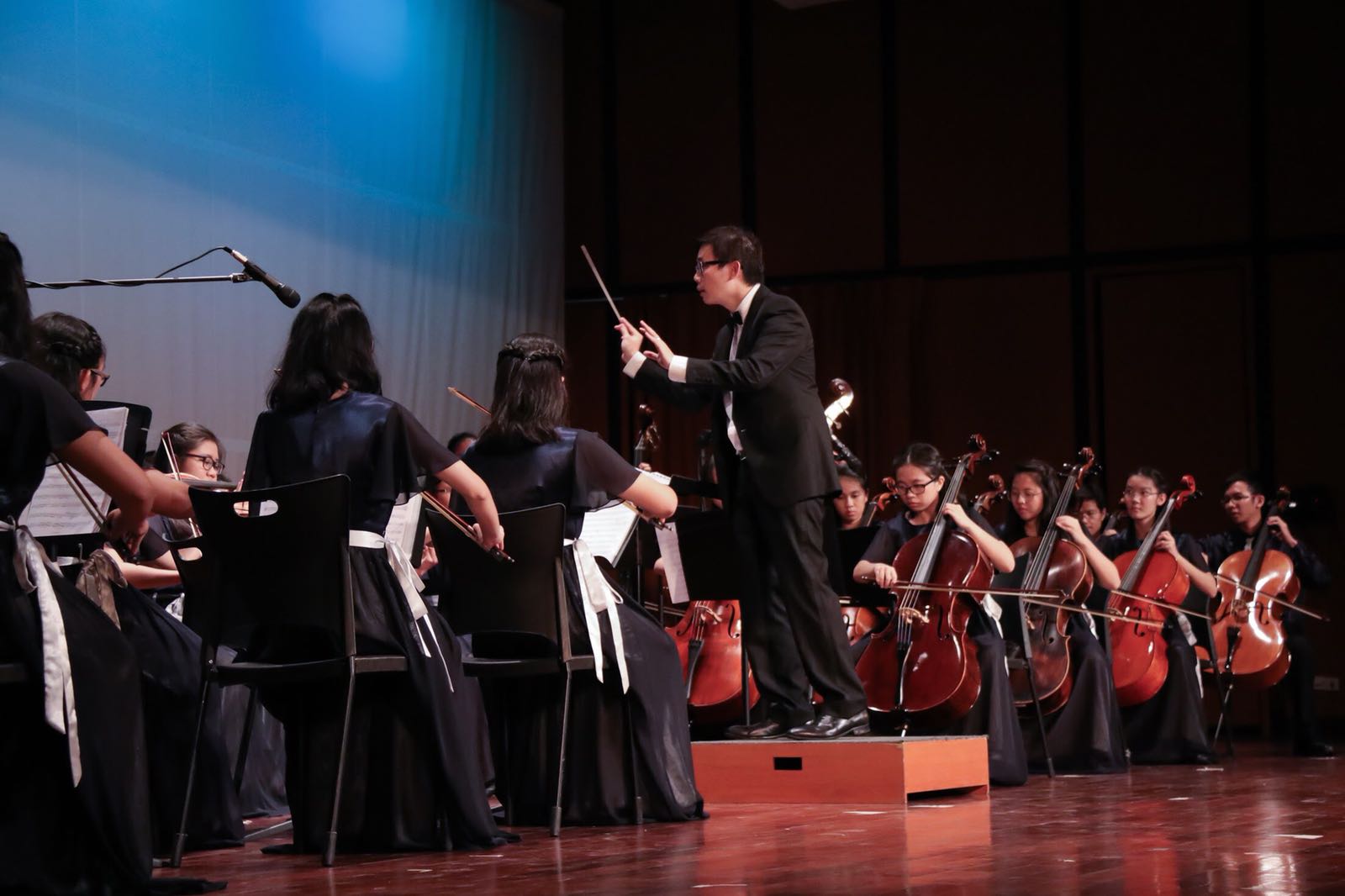 Loi previously conducted River Valley High School's orchestra CCA for four years. Photo courtesy of Jesher Loi.
Loi previously conducted River Valley High School's orchestra CCA for four years. Photo courtesy of Jesher Loi.
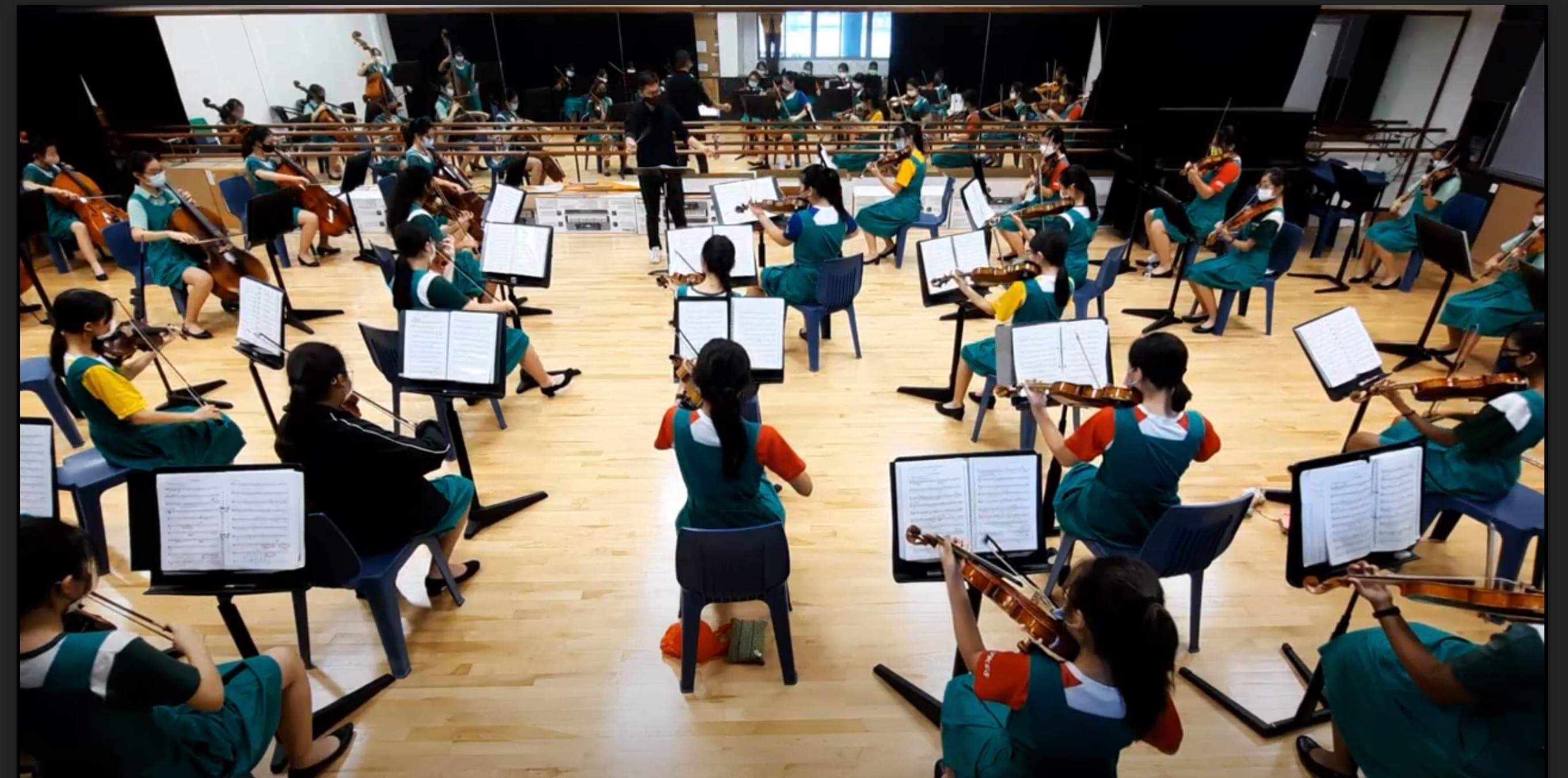 Loi continues to conduct Tanjong Katong Girls' School String Ensemble. Photo courtesy of Jesher Loi.
Loi continues to conduct Tanjong Katong Girls' School String Ensemble. Photo courtesy of Jesher Loi.
The fact is that I really enjoy working with students. There is this dynamic about working with them — they are so innocent, and they react so well. There is still that spark of excitement within them.
And I share my own story with them. I remind them, "You guys, please don't pick math because you are good at it. You must be very sure you want to be a statistician or a teacher. Don't just say, 'Oh, I'm good at it so I'll go study math.'"
I always ask them, "Do you know what do you want do in life or not?" Most of the time, they reply, "Oh, actually, I don't know."
So, like I tell my students, put the cart before the horse. First go and explore... find out what kind of job or industry you want to work in. Then choose what you want to study. Don't think to yourself, "I'm good at this subject so I want to study that."
I think it is good to have a plan because, of course, you cannot go through life without one. However, if you hold your plans too tightly, then you may not actually enjoy the process.
Nor is it certain that you will enjoy the resulting outcome; the reality may be very different from what you had originally projected. It is good to have a plan, but you must also hold it loosely in your hand.
Read our interview with Jesher and Adrin Loi, the family founders of Ya Kun, here:
Top photo: Enterprise Magazine, via Grace Fu's Facebook page
If you like what you read, follow us on Facebook, Instagram, Twitter and Telegram to get the latest updates.
